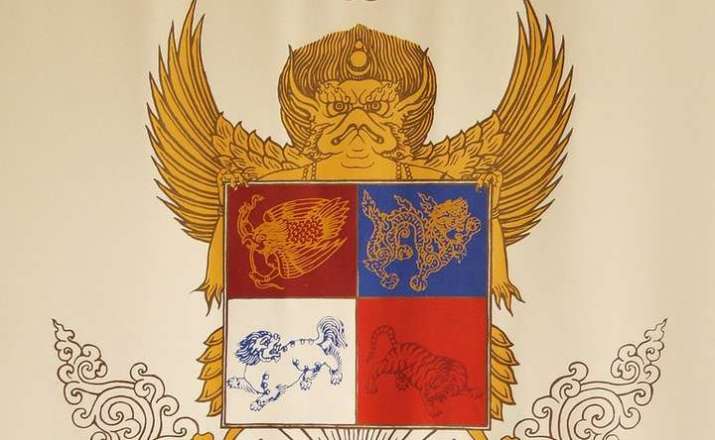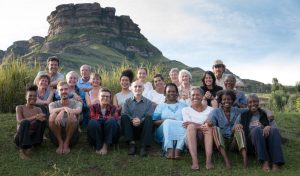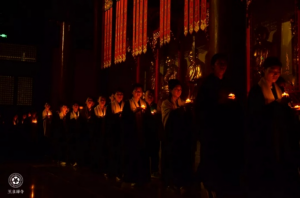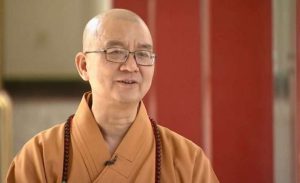
SEATTLE—Shambhala International, one of the West’s largest and most successful Buddhist communities, announced this month that it will actively investigate allegations of abuse by its teachers.
In an open letter to members of the Shambhala International community, leaders of the organization credited the #metoo movement for “shining a light on sexual harassment, abuse, and gender harm worldwide,” and also sparking a wake-up call within the Shambhala community.
Shambhala International, which has 165 centers around the world, is led by Sakyong Mipham Rinpoche, son of the famous Tibetan Buddhist teacher Chögyam Trungpa Rinpoche. Trungpa was one of the pioneers of Buddhism in America, founding the Naropa Institute (now University) in Boulder, Colorado, in 1974, which has hosted cultural luminaries such as Ram Das and Alan Ginsburg.
In the letter, the Kalapa Council—Shambhala’s leadership body consisting of Sakyong Mipham, his wife Dechen Chöying Sangmo, and senior Shambhala members—offers its gratitude to those calling for change, acknowledging “instances of sexual harm,” and admiting that, despite efforts thus far, “we have much to learn.”
The organization’s leadership promise training and transparent processes, along with increased leadership opportunities for marginalized groups, to eradicate sexual harm and abuse within the community.
The full letter is reproduced below:
The Kalapa Council would like to share an important message with the worldwide Shambhala community. The following message is being e-mailed to all members today.
We welcome your feedback, thoughts and concerns. To contact the council, please write to us at [email protected]. Please contact us via this e-mail address as we are unable to address individual comments on social media at this time.
Our path to understanding and care starts here, with deep listening and acknowledging our blind spots.
———-
Shambhala Community Letter Addressing Harm
Dear Shambhalians,
Today we write to you with full and broken hearts. The world is in turmoil, with growing awareness of aggression, injustice, and cruelty unfolding before our eyes every day. The #metoo movement is shining a light on sexual harassment, abuse, and gender harm worldwide, and we in Shambhala are going through our own collective wake-up call.
In our complex history there have been instances of sexual harm and inappropriate relations between members and between teachers and students. We are still emerging from a time in which such cases were not always addressed with care and skill. In particular, inappropriate or even abhorrent sexual behavior by some men in the community has caused some women to feel unsafe. Members have at times not felt heard or have been treated as though they are a problem when they tried to bring complaints forward. We are heartbroken that such pain and injustice still occurs. The Kalapa Council takes responsibility for creating spaces to recognize and heal wounds from the past, and we are feeling how full attention to such healing is in great need.
We want to be clear that we, as a leadership body, stand firmly against all forms of abuse and discrimination and any efforts to suppress reports of wrongdoing or shame victims. Yet our ignorance or uncertainty as to how to address the systemic nature of these harms has made us a part of the problem. We must do better.
As we struggle with these issues in Shambhala we are also part of a charged cultural reckoning in contemporary society. We feel and hear the questioning, doubt, and anger. We are also witnessing allegations and rumours. At the same time, there are many in our community who are just entering this conversation. The pain of this issue can lead to splintering, and we invite everyone to stay connected with their hearts, and with each other. We are all seeking a responsiveness that attends to the urgency, but that is well informed and that leads to lasting, rather than surface level change. Traditionally this time of year, known as Dön season, is when heightened energy can take hold. We invite a profound and soft openness so that we can see the way forward together.
We also feel gratitude for the people who have been demanding change and for those who have been working for decades to establish strong care and conduct responses and policies (members can log in and see our International Shambhala Care and Conduct Policy here). This is a formal process that investigates all complaints. You can also read more in this article on work within the community that addresses sexual harm. We appreciate the steps that have been taken and how this has led to significant changes in our culture. Yet we have much to learn.
The Kalapa Council is in a process of listening and feeling. As we hear and learn more, we have committed collectively and individually to undertake training to help us better understand power dynamics and gender harm. Through this work, we will move toward a comprehensive plan to address abuse and discrimination within our Shambhala culture, including the guidance of others. We cannot do this in isolation. We commit to communicating clear next steps within a month.
The changes in Shambhala must include learning from marginalized people, cultures and communities. The conversation around harm towards women is part of our growing awareness of systemic power and privilege that results in social exclusion in our greater society and within our sangha. It is not possible to shine light on only one social issue without also seeing the interrelated injustices around race, gender, class, whiteness, transphobia, homophobia, nationality, age, ethnicity, language and other differences. We also recognize that many others in our sangha face multiple forms of marginalization and exclusion that are not solely sexual. These groups can often feel overwhelmed by the intersection of racism, queer- and transphobia, and misogyny in the wider world and within Shambhala. We are committed to eradicating sexual harm through training and transparent processes, as well as facilitating leadership opportunities for marginalized groups.
Our path to understanding and care starts here, with deep listening and acknowledging our blind spots. We supplicate you all to be in this with us together. It is time to address the deepest and most systemic roots of suffering and we are confident that through this process we will become a more kind and powerful community. Our way forward is still emerging, and it will surely be imperfect, but with love, kindness and tenderness in our hearts, we aspire to build a more enlightened society together.
As we approach Shambhala Day, it feels like an appropriate time for introspection and to reflect on pain or damage we may have caused individually or collectively. It is also a time to contemplate our love and our fearless resolution to manifest societal goodness. In the coming period, we commit to offering ways to speak and listen, to ask for the help our community needs, to further train our leaders, to establish robust and effective structures for accountability, and to create safe spaces for nourishing trust and care.
Yours in the vision of the Great Eastern Sun,
The Kalapa Council
Resources:
Contact Us: The Kalapa Council welcomes your feedback, thoughts and concerns. To contact us, please e-mail [email protected].
Care and Conduct Policy: Shambhala Members can access the International Care and Conduct Policy via the link below. Please note that you must be logged in as a member to access this page:https://shambhala.org/members/societal-health-wel












